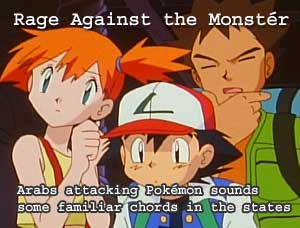by Luis Reyes
 |
||||
|
In March, when Saudi Arabia announced a fatwa against "Pokémon," essentially banning the popular children's show and all
related merchandise from the country, a rash of similar bans spread across the Middle East. Sheikh Yussef Qardawi of
Qatar followed on April 5. In the wake of this hysteria, Oman, Dubai and Egypt all joined in the mass Muslim
condemnation of this seemingly innocuous Japanese import.
No single element of the "Pokemon" franchise gets all the blame. Some critics note that "Pokemon" promotes gambling
and the spread of evolutionary theory, both antithetical to a fundamentally Islamic lifestyle. Others point to it as
evidence of a Jewish conspiracy, claiming that the word "Pokemon" either means "I am a Jew" in Japanese or "there is no
God in the world" in ancient Syriac. (Though "Pikachu" actually rhymes with "I'm a Jew" in English, no one cited it as
further evidence of the Jewish plot.)
Arguments defending "Pokemon" against such a barrage of ill-founded criticism have been best articulated by Akadot
in its duo of Top Ten lists dedicated to this topic, Reasons Why "Pokémon" is Actually a Jewish Conspiracy (5/11/01)
and Problems with the reasoning that "Pokémon" is a Jewish Conspiracy (05/04/01). However, while the media rails on
the ridiculousness of these fatwas, very little gets through about how this reflects on America's own moral policing
and how events such as this surface latent anti-Islamic sentiments in a country which prides itself on being a melting
pot for the world.
Michael Slackman's April 24th LA Times article "Arabs See Jewish Conspiracy in Pokemon," though itself relatively
balanced by drawing a distinctive line between the actions of Muslim nation leaders and the beliefs of Islamic people
as a community, triggered several letters from Islamic-Americans. Abobaker Tukhi of Corona, California answered in the
April 25th edition of the LA Times:
"I look forward to the day when Islam is portrayed as the religion of 6 million Americans who contribute to their
communities and neighborhoods � Unfortunately, that day is not today, as all too often I see images that only portray
Muslims as extremist, violent and intolerant."
Tukhi's frustration stems from a blockbuster movie culture in which the Middle East has replaced the communists
as the enemy. The particularly insipid "True Lies" released by James Cameron in the early nineties typifies the trend
of vilifying Muslims (while also tallying in as one of the most misogynist pieces to come out in this day and age when
mainstream directors should know better). A need to find an enemy eclipses the need to develop a global understanding
of people. So, while Americans ridicule Muslim leaders for perceiving a Jewish conspiracy in something as innocuous
as "Pokemon," they hypocritically believe that Islamic people are engaged in a global conspiracy against Americans.
And as a consequence our government punishes Sadaam Hussein by withholding much needed supplies to the Islamic people
of Iraq and backs an Israeli government headed by a man determined to eradicate the Palestinians.
|
||||
